How Farm to School is Connecting Michigan Kids to Healthy Food
In Michigan, service members, local farmers, legislators and a school chef are teaming up to get kids excited about healthy, local foods.
Join our corps! Applications for 2026-2027 are now open. Apply by March 30.
In Michigan, service members, local farmers, legislators and a school chef are teaming up to get kids excited about healthy, local foods.
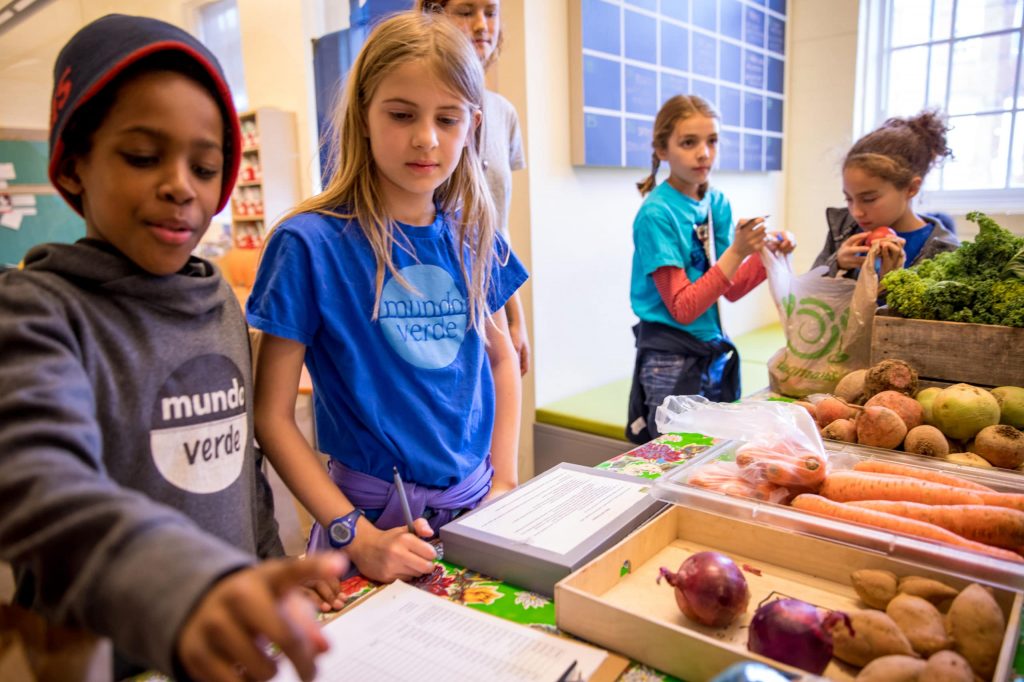
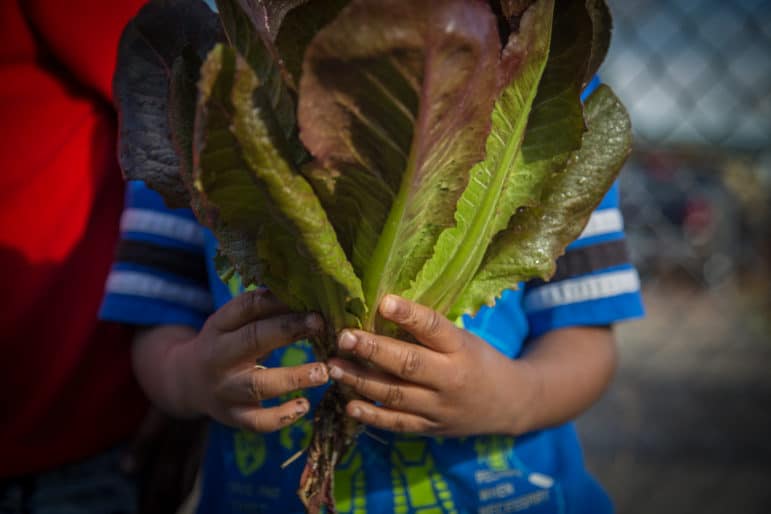
With child nutrition reauthorization (CNR) underway in Congress this year, a unique window of opportunity has opened to ensure that children have greater access to healthy, fresh, local foods across the country. As Congress debates its priorities for CNR, advocates and legislators might look to the experiences of FoodCorps service members and community partners in northern Michigan.
FoodCorps service members have connected over 50,000 students to healthy food in Michigan since 2010 and provided more than 700 food education lessons last year alone. These service members’ experiences highlight the importance of farm to school, as well as the role of food education, such as hands-on garden lessons and taste-testing, in helping students build lifelong healthy habits. By providing students opportunities to try new and different foods through these activities, FoodCorps service members help connect the dots between local farms and school gardens, classrooms, and cafeterias.
In the midst of a pandemic that transformed the school environment, increased food insecurity, and exacerbated racial inequities, these service members’ stories highlight the critical value of building a food system that benefits farmers, students, and communities in Michigan and beyond.
With agriculture as its second largest industry and with an exciting network of programs such as 10 Cents a Meal for Michigan Kids & Farms, Michigan is a national leader in building strong local food systems, especially by championing farm to school programs.
Farm to school advocate Chef Nathan Bates of Boyne Falls Public Schools says schools have played a key role in supporting farms in his community in northern Michigan. He noted that when schools buy food products from local farmers, it opens up an incredible market opportunity for those farmers who otherwise may struggle to meet their bottom line by only selling at farmers’ markets.
10 Cents a Meal gives small growers a new market for their produce while also removing that cost barrier we keep hearing about from schools trying to buy local food. By exposing students to healthy foods and growing kids’ excitement about trying new foods, FoodCorps is critical to making this policy work.” — Jen Schaap, FoodCorps site supervisor and Local Food Policy Specialist at the Petoskey Office of the Groundwork Center
Institutionalizing local procurement is helping to accelerate a dynamic farm to school movement in northern Michigan that continues to reach new milestones.
“All of that collective work with individual schools has led us to a tipping point in our region where the Intermediate School District is excited to help support farm to school activities across the region,” said Jen Schaap, FoodCorps site supervisor and Local Food Policy Specialist at the Petoskey Office of the Groundwork Center.
This progress foreshadows an exciting road ahead in Michigan. Yet, as farm to school initiatives grow, it is critical to recognize the important role that food and nutrition education plays in ensuring that the local foods served to students in school cafeterias are recognized, eaten, and enjoyed.
Farm to school benefits farmers, students, and schools while also supporting local economies and communities. And food education plays a key role in helping to make the most of farm to school.
Janie Noah and Hope Heideman — two FoodCorps service members serving through the Groundwork Center in northern Michigan schools — gave a glimpse into how their food and nutrition lessons in classrooms help support farm to school and build demand for locally sourced foods.
To demonstrate this connection, Noah and Heideman gave the example of a local farm that had recently donated a generous amount of goat cheese to their schools. Using the donation, they were able to do taste-testing activities with the students, many of whom had never tried goat cheese.
In one of Heideman’s classes of sixth graders, getting the students excited about the goat cheese was somewhat challenging. “Only one of them originally took the sample,” Heideman said.
Throughout the class, Heideman played videos from the farm, showcasing footage of the farmer with baby goats talking about the cheese making process. With each video, in-class lesson, and conversation about the importance of trying new foods, more and more students became excited to try the sample.
Heideman went on to describe, “Then, at the end of the class, as we kept talking about [how trying new foods] can make us nervous, all but one student eventually tried [the goat cheese] and most of them liked it. It was really great to see that progression.”
Noah added from her own experience doing the goat cheese taste-testing with kindergarten and first-graders, “That opportunity was really great because I was able to start conversations with students about locally produced foods and the importance and benefits of supporting local producers. And the fact that they were able to bring something home to share with their families was awesome.”
The impact of food education led by FoodCorps service members extends beyond activities in the classroom. It also diffuses into the cafeteria and home environment.
Discussing how food education has impacted the students that he sees in the cafeteria, Chef Nathan said, “It makes my job easier when a kid is coming through the lunch line and says, ‘Oh, we had these with Miss Casey,’ or ‘Oh, we used to have these roasted. Are you gonna roast them tomorrow?’ Anything that makes kids think their lunch is interesting is a win for me.”
According to Chef Nathan, local farmers tell him about families who come to the farmers’ market asking for specific greens that their kids had been introduced to at school.
It makes my job easier when a kid is coming through the lunch line and says, ‘Oh, we had these with Miss Casey,’ or ‘Oh, we used to have these roasted. Are you gonna roast them tomorrow?’ Anything that makes kids think their lunch is interesting is a win for me.” — Chef Nathan Bates, Boyne Falls Public Schools
These stories demonstrate the ways in which food education serves as a crucial connector for farm to school — building the excitement, interest, and demand among students for healthy, locally-produced foods.
Schaap summarized this crucial connection by talking about 10 Cents a Meal, the state-funded program that matches school purchases of Michigan-grown fruits and vegetables for up to ten cents per meal.
“10 Cents a Meal gives small growers a new market for their produce while also removing that cost barrier we keep hearing about from schools trying to buy local food. By exposing students to healthy foods and growing kids’ excitement about trying new foods, FoodCorps is critical to making this policy work.”
These farm to school stories demonstrate opportunities to build upon the farm to school momentum in northern Michigan to support farmers, children, and local communities across the state and country.
Schaap described the excitement of seeing state legislators in Michigan come together in a bipartisan way to support farms and get healthy food into schools — for example, by expanding the 10 Cents a Meal program from a pilot that started in 2016 to a $2 million statewide program today. Schaap added, however, that more still needs to be done.
When asked what improvements they would like to see in the future related to farm to school in Michigan, these individuals spoke about possibilities ranging from free school meals for all to further increasing the funding for the 10 Cents a Meal program to making it possible to hire chefs in schools on a livable wage to help promote scratch cooking.
One thing, however, was clear: the work of these champions in northern Michigan and the progress they have made is proof of the power of food education and farm to school. Their work serves as an inspiration for communities across the country and members of Congress as they review our nation’s child nutrition programs.
Thanks to CoBank for its support of FoodCorps and farm to school efforts in Michigan.
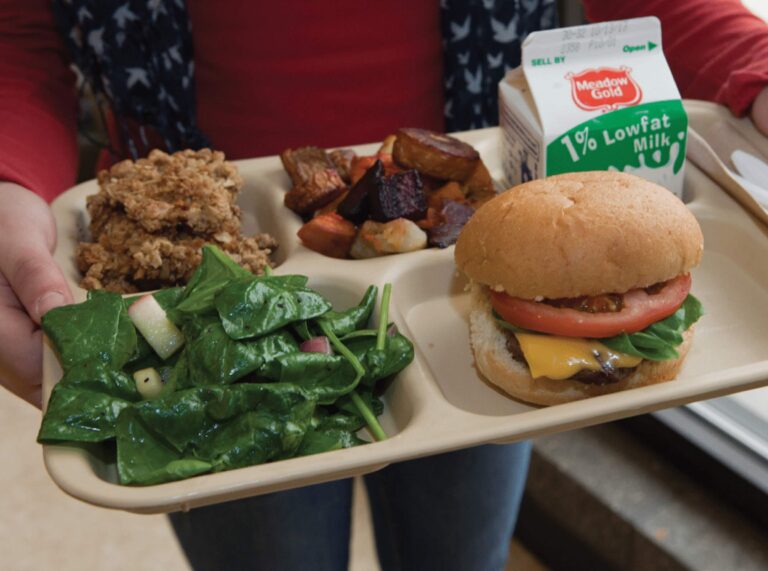
3 Reasons We Need School Meals for All
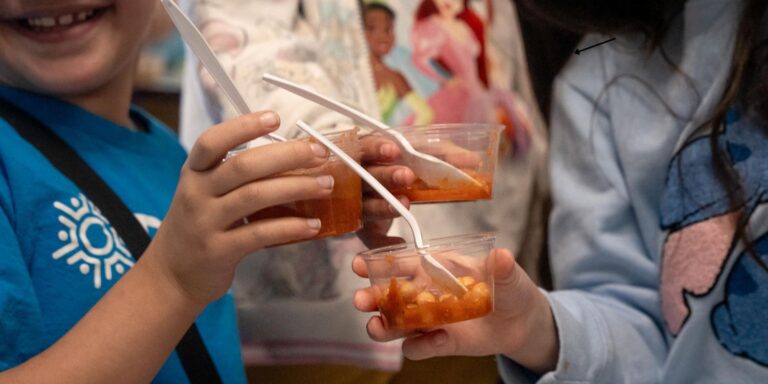
Mindful Tasting: Eating with All 5 Senses
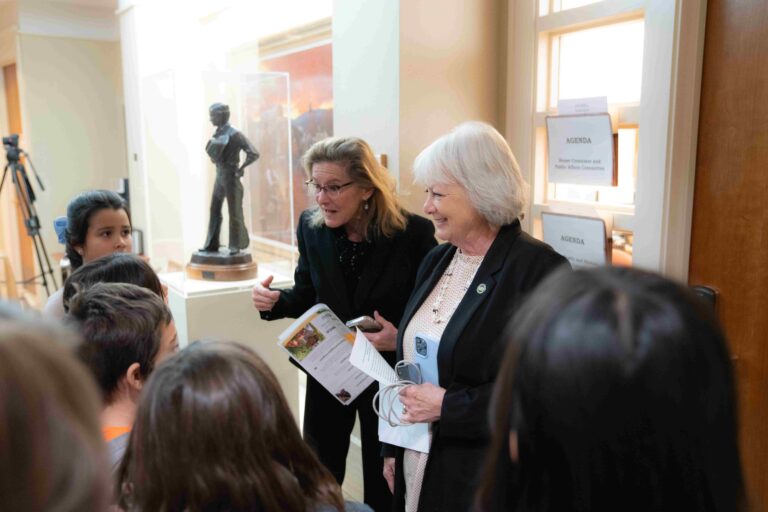
Our 2025 Child Nutrition Policy Year in Review